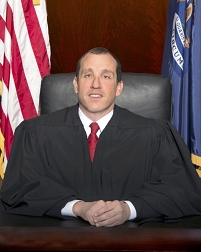Erstellt am: 17. 3. 2017 - 13:34 Uhr
The Blind Justice
Vision, says Justice Richard Bernstein, is what leads to prejudice. “For the most part you’re going to prejudge somebody by how they’re dressed or the colour of their skin, or other attributes that are visual”. And that, he believes, leads to discrimination. “The idea of justice is that it’s supposed to be blind. If you take vision out of the equation, I think you’re actually a much better judge.”

bettertogether Kommunikationsagentur
Richard Bernstein is blind and he is a Supreme Court justice in the US state of Michigan, the first blind person to be elected to such a position. I met him in February when he was in Vienna to attend the Zero Project Conference on creating more employment opportunities for people with disabilities. Having been blind from birth, Richard openly acknowledges the challenges he has faced, and readily agrees that he has enjoyed advantages that many others don’t. Born into a well-off family of attorneys, he had the “best of everything” when it came to things like therapy, schools, and assistance. In the US, he says, 85 per cent of blind people are unemployed and had he been born into different, less privileged circumstances, he believes he would be one of them.
With the help of personal assistance, Richard went to university and then law school, memorising the course work and dictating answers in exams. He joined the family law firm, taking up cases which involved disability rights and his work often paved the way for new standards for safety and accessibility for people with disabilities. He became a lawyer because his passion was “using the law to try to make life better for people, and using the law to have a positive impact”.

Michigan Supreme Court
In 2014 Richard was elected to the Michigan Supreme Court, which consists of seven justices and which receives more than 2,000 applications a year to appeal a verdict from a lower court. Running as a Democrat with a small budget and under the slogan “Blind Justice” his campaign was David to his Republican opponent’s well-funded Goliath, and it turned out that Richard’s experiences as a blind person made him the preferred candidate: surveys showed that many of those who voted for Richard believed that having gone through his own personal struggles, he would have more understanding and compassion for the struggles of others.
FM4 Reality Check
Hear the Saturday Reality Check Special "The Blind Justice" on Saturday, March 18 at 12 noon in FM4's Reality Check in the FM4 Player or subscribe to the podcast and get the whole programme after the show
And how does Justice Bernstein actually handle the daily workload of a state Supreme Court judge? With the support of a team of 6 clerks, hard work (12 to 15 hours a day) and by learning each case – there are 26 to review each week – off by heart in every detail. Many of these cases will be the last chance for someone serving a jail sentence to appeal. And “if you’re advocating, you better know what you’re advocating for and you’d better know it well; if I am not prepared, if I cannot make my argument sufficiently then a citizen of the state of Michigan could languish for the rest of their life in prison. When the stakes are that high, it doesn’t matter if you’re blind or not, you’re either ready to argue or you’re not, and when the stakes are that high, there are no excuses."



